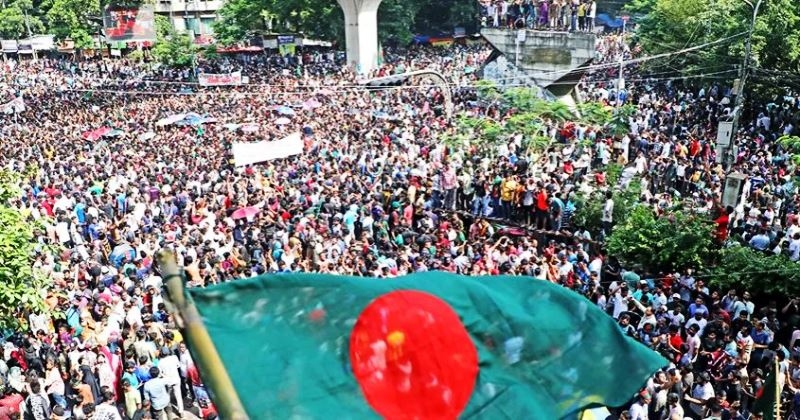- CA Yunus pays homage to Liberation War martyrs on Victory Day |
- Bangladesh capital market extends losing streak for second day |
- Bangladesh celebrates Victory Day Tuesday |
- 'Different govts presented history based on their own ideologies': JU VC |
Honoring the Spirit of July Uprising for a New Bangladesh

Mass Uprising of 5 July 2024
The government’s declaration of August 5 as July Uprising Day and August 8 as New Bangladesh Day marks more than a symbolic gesture—it is a reckoning with history and a bold step toward reclaiming the nation’s democratic soul. These commemorations honor the student-led movement that, through sheer courage and collective will, dismantled an entrenched autocracy and ignited a national awakening.
The July Uprising was not merely a protest—it was a generational verdict against authoritarianism, nepotism, and the erosion of sovereignty. For years, the Awami League regime had traded Bangladesh’s autonomy for international patronage, prioritizing regime survival over national dignity. The result was a hollowed-out democracy, where institutions served power rather than people, and dissent was met with repression rather than reform.
But the youth of Bangladesh refused to inherit silence. Their defiance, sparked by the reinstatement of a discriminatory quota system and inflamed by the regime’s contemptuous rhetoric, evolved into a mass movement that transcended campuses and class lines. On August 5, 2024, they achieved what many thought was impossible: they unseated a government that had long mistaken longevity for legitimacy.
The formation of the interim government on August 8, led by Nobel Laureate Professor Muhammad Yunus, signaled not just a change in leadership but a shift in national ethos. It was a declaration that Bangladesh would no longer be governed by fear, but by consensus; not by dynastic entitlement, but by democratic mandate.
Today, as the National Consensus Commission engages with political parties to forge a shared vision for reform, the stakes could not be higher. The work of the twelve reform commissions has laid a foundation, but it is the consensus process that must now translate aspiration into architecture. Proposals for a bicameral legislature, term limits for the prime minister, and a depoliticized judiciary are not merely technical adjustments—they are safeguards against the return of authoritarianism.
Yet, the path ahead is fraught with challenges. Consensus demands compromise, and reform demands courage. The temptation to revert to old habits—of centralization, of exclusion, of expediency—will be strong. But the memory of the July Uprising must serve as a compass. It reminds us that democracy is not a gift bestowed by rulers, but a right claimed by citizens.
As the nation prepares for general elections most likely in February, the challenge is clear: to institutionalize the spirit of the uprising into a durable democratic framework. That means protecting civil liberties, ensuring electoral integrity, and building a political culture where power is accountable and inclusive.
Bangladesh stands at a crossroads. One path leads back to the shadows of subservience and suppression. The other leads forward—to a republic rooted in equality, justice, and sovereignty. The choice, as always, belongs to the people. But this time, they have already shown the world what they are capable of.

